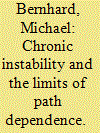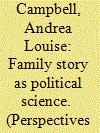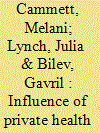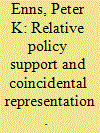|
|
|
Sort Order |
|
|
|
Items / Page
|
|
|
|
|
|
|
| Srl | Item |
| 1 |
ID:
142735


|
|
|
|
|
| Summary/Abstract |
Historical institutionalism challenged older forms of comparative historical analysis by moving away from purely structural explanations of historical outcomes. Instead it posited that there were critical junctures in which actors chose between institutional alternatives, which in turn led to path dependence. I examine a phenomenon neglected both by historical institutionalism and older forms of historical analysis—chronic instability. Instead of institutional lock-in, some junctures lead to periods of instability in which a series of regimes replace each other in rapid succession. Three different causal mechanisms that routinely contribute to chronic instability—external shocks, changing configurations of actors, and disjuncture between the logic of change and mechanisms of reproduction—are explored in depth. The plausibility of the theory is illustrated by an examination of regime instability in Germany from the collapse of the Empire in 1918 through the founding of the Federal Republic in 1949.
|
|
|
|
|
|
|
|
|
|
|
|
|
|
|
|
| 2 |
ID:
142738


|
|
|
|
|
| Summary/Abstract |
Can the people deliberate to set the agenda for direct democracy in large scale states? How might such an institution work? The 2011 California Deliberative Poll piloted a solution to this problem helping to produce proposals that went to the ballot and also to the legislature. The paper reports on how this pilot worked and what it suggests about a possible institution to solve the deliberative agenda setting problem. The legislative proposal passed the legislature but the ballot proposition (Prop 31) failed. However, we show that the proposals actually deliberated on by the people might well have passed if not encumbered by additional elements not deliberated on by the public that drew opposition. The paper ends with an outline of how the process of deliberative agenda setting for the initiative might work, vetting proposals once every two years that could get on the ballot for a greatly reduced cost in signature collections. Adding deliberation to the agenda setting process would allow for a thoughtful and informed public will formation to determine the agenda for direct democracy.
|
|
|
|
|
|
|
|
|
|
|
|
|
|
|
|
| 3 |
ID:
142739


|
|
|
|
|
| Summary/Abstract |
Intimate ethnography presents a number of challenges: How could I write about my own family in a way that was true to their experience but also an “objective” report? How could I convey telling details without robbing my family of their privacy? How could I rein in my emotions to report their story, and did I pick and choose facts to protect them or to make them more sympathetic? How could I generalize from their experience to that of millions of social assistance recipients? In this Reflections essay, I consider these challenges in light of what other social scientists have said about the issues of close work with individual, sometimes vulnerable, research subjects.
|
|
|
|
|
|
|
|
|
|
|
|
|
|
|
|
| 4 |
ID:
142733


|
|
|
|
|
| Summary/Abstract |
Using individual-level data from the 2008 European Social Survey and country-level health care financing data we analyze the influence of private financing of health care on political trust in twenty-five European countries. Net of known predictors of trust at the individual and country level, we find that trust in government is significantly lower where the health system is financed to a greater degree by private sources. This negative relationship occurs because in countries with more private financing, low-income citizens perceive themselves to be at greater risk for not receiving needed health care. This perception of risk is associated with more negative evaluations of the performance of the health care system, which in turn is associated with less trust in government. When states do less to ensure the basic health care needs of members of society who are at greatest risk, these citizens may come to place less trust in government institutions. Hence, the increasing pressure on European governments to privatize the financing of health care in the wake of the financial crisis that is also characterized by growing income inequality threatens to make citizens trust government less. At the same time, implementation of the Affordable Care Act could signal a renaissance for political trust in the United States, if a growing role in the health care system is accompanied by a redistribution of risk.
|
|
|
|
|
|
|
|
|
|
|
|
|
|
|
|
| 5 |
ID:
142737


|
|
|
|
|
| Summary/Abstract |
This article documents the prevalence in organized interest politics in the United States of organizations—for example, corporations, think tanks, universities, or hospitals—that have no members in the ordinary sense and analyzes the consequences of that dominance for the democratic representation of citizen interests. We use data from the Washington Representatives Study, a longitudinal data base containing more than 33,000 organizations active in national politics in 1981, 1991, 2001, 2006, and 2011. The share of membership associations active in Washington has eroded over time until, in 2011, barely a quarter of the more than 14,000 organizations active in Washington in 2011 were membership associations, and less than half of those were membership association with individuals as members. In contrast, a majority of the politically involved organizations were memberless organizations, of which nearly two-thirds were corporations. The dominance of memberless organizations in pressure politics raises important questions about democratic representation. Studies of political representation by interest groups raise several concerns about democratic inequalities: the extent to which representation of interests by groups is unequal, the extent to which groups fail to represent their members equally, and the extent to which group members are unable to control their leaders. All of the dilemmas that arise when membership associations advocate in politics become even more intractable when organizations do not have members.
|
|
|
|
|
|
|
|
|
|
|
|
|
|
|
|
| 6 |
ID:
142734


|
|
|
|
|
| Summary/Abstract |
I propose the concept of “ignoring” to capture situations in which government officials appear dismissive (either through inaction or contempt) of popular mobilization. The concept refers not only to actions by regime officials but also captures protesters' perceptions of those actions. Examples of ignoring include not communicating with protesters, issuing condescending statements, physically evading protesters, or acting with contempt toward popular mobilization. Existing conceptual tools do not adequately capture these dynamics. Although repression and concessions have been extensively theorized, scholars lack conceptual tools to understand responses that fall short of both repression and concessions. I introduce the concept of “ignoring” as a useful tool to focus on a subset of actions on the part of regime officials who are the targets of mobilization, with discernible consequences for subsequent mobilization. Drawing on research on the role of emotions in protest politics and on framing and social movements, I argue that ignoring protests can trigger emotional responses that encourage people to engage in protest, such as anger, indignation, and outrage. By integrating protesters' perceptions of the behavior of the targets of mobilization, not just of the security forces, the concept of “ignoring” helps explain protesters' reactions and their future mobilization, in a way that conventional concepts such as tolerance cannot capture. This analysis has important implications for broader theoretical debates on the relationship between regime response to protests and subsequent mobilization. Most importantly, it urges scholars to consider how ignoring can interact with other responses to mobilization, thereby altering the dynamics of the infamous the “concession-repression dilemma.” I use evidence from workers' protests in late Mubarak Egypt to illustrate these dynamics.
|
|
|
|
|
|
|
|
|
|
|
|
|
|
|
|
| 7 |
ID:
142740


|
|
|
|
|
| Summary/Abstract |
The finding that the preferences of middle-income Americans are ignored when they diverge from the preferences of the rich is one of the most widely accepted and influential conclusions in political science research today. I offer a cautionary note regarding this conclusion. I demonstrate that even on those issues for which the preferences of the wealthy and those in the middle diverge, policy ends up about where we would expect if policymakers represented the middle class and ignored the affluent. This result emerges because even when middle- and high-income groups express different levels of support for a policy (i.e., a preference gap exists), the policies that receive the most (least) support among the middle typically receive the most (least) support among the affluent (i.e., relative policy support is often equivalent). As a result, the opportunity of unequal representation of the “average citizen” is much less than previously thought. The analysis also shows, however, that substantial opportunity exists for unequal representation of strong partisan preferences. Together, these results reinforce the importance of party identification for understanding policy outcomes and who gets represented.
|
|
|
|
|
|
|
|
|
|
|
|
|
|
|
|
| 8 |
ID:
142736


|
|
|
|
|
| Summary/Abstract |
Before the welfare state, people were protected from disabilities resulting from illness, old age, and other infirmities by care work provided within the family. When the state assumes responsibility for care-work tasks, in effect it assumes parental roles, thereby becoming a form of familial government in which the public provision of goods and services is analogous to care work provided in the family. My research pushes back the origins of the state’s obligation to care for people to a preindustrial form of government, hereditary monarchies—what Max Weber termed patrimonialism. It explicates how monarchs were cast as the parents of the people, thereby constituting kingship as a care work regime that assigned to political rulers parental responsibility for the welfare of the people. Using historical and quantitative analysis, I establish that retaining the legitimacy of monarchies as the first form of familial government in the course of Western European democratizing makes it more credible to the public and to political elites to accept the welfare state as the second form of familial government. That, in turn, promotes a more robust public sector supportive of social provision. The results reformulate conceptions of the contemporary welfare state and its developmental legacies.
|
|
|
|
|
|
|
|
|
|
|
|
|
|
|
|
|
|
|
|
|